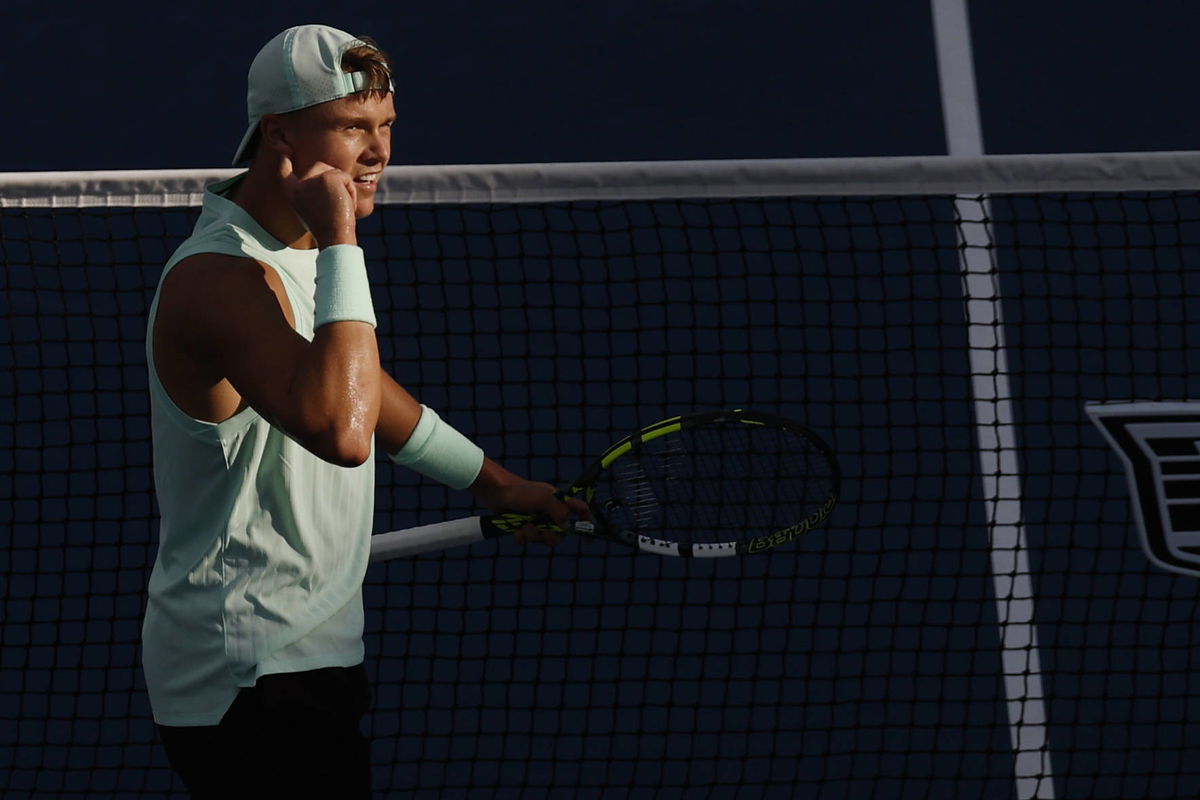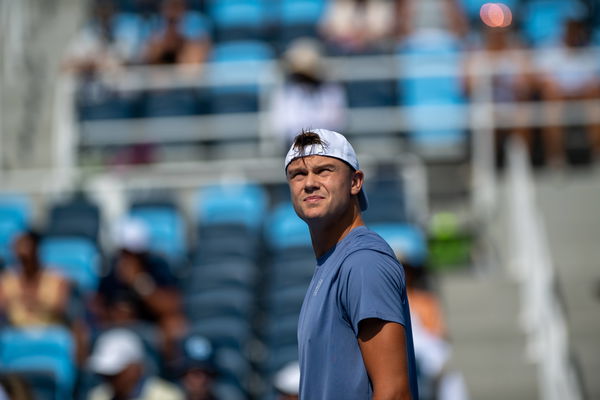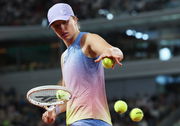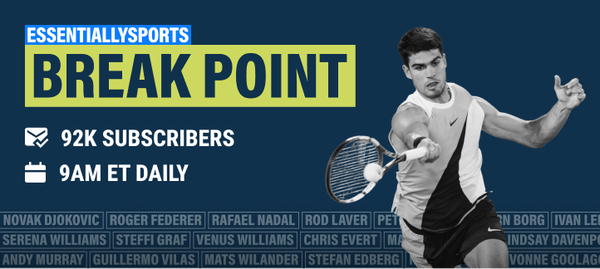
Imago
Tennis: US Open Aug 25, 2025 Flushing, NY, USA Holger Rune DEN reacts after winning the second set tiebreaker against Botic van de Zandschulp NEDnot pictured on day two of the 2025 US Open tennis tournament at USTA Billie Jean King National Tennis Center. Flushing Louis Armstrong Stadium NY USA, EDITORIAL USE ONLY PUBLICATIONxINxGERxSUIxAUTxONLY Copyright: xGeoffxBurkex 20250825_gkb_sb4_057

Imago
Tennis: US Open Aug 25, 2025 Flushing, NY, USA Holger Rune DEN reacts after winning the second set tiebreaker against Botic van de Zandschulp NEDnot pictured on day two of the 2025 US Open tennis tournament at USTA Billie Jean King National Tennis Center. Flushing Louis Armstrong Stadium NY USA, EDITORIAL USE ONLY PUBLICATIONxINxGERxSUIxAUTxONLY Copyright: xGeoffxBurkex 20250825_gkb_sb4_057
With a 6-4, 2-2 lead and a laser-like focus, Holger Rune was unstoppable in the Nordic Open semifinal in Stockholm. Then the dreaded “pop” arrived. Adrenaline was replaced by tears, pain took over, and his leg gave out. In a matter of seconds, the young Danish star’s season came to an abrupt end. Not only did that moment end a match, but it also brought up difficult questions about what is driving these athletes to the limit. How did this happen? And who bears the blame?
Watch What’s Trending Now!
A few days later in Copenhagen, Holger was recovering from Achilles surgery at Aleris-Hamlet Hospital, grappling with the harsh reality. “It’s been some really hard days, and I’ve been very, very sad about it,” he confessed. “But I’m glad the surgery went well and I’ll get through this. I know it takes patience, but I’m going to work hard at rehab every single day and give it everything I have to come back strong.” But this story isn’t just about one injury. It’s also about what caused it or, as Rune’s mother and manager, Aneke Rune, sees it, what keeps causing it in professional tennis.
Well, just recently, Aneke wasted no time blaming the ATP’s brutal schedule for her son’s breakdown. “There have simply been too many mandatory tournaments,” she told B.T. Sport. “Tournaments that the players are obliged to participate in, and where they are severely penalised financially by not playing them all. The players simply do not have time to recover properly throughout the season.” She didn’t stop there.
ADVERTISEMENT

Imago
Cincinnati Open Round Of 16: Francis Tiafoe V Holger Rune Holger Rune is seen during his Round of 16 match at the Cincinnati Open in Mason, Ohio, on August 13, 2025. Mason Ohio United States PUBLICATIONxNOTxINxFRA Copyright: xJasonxWhitmanx originalFilename:whitman-cincinna250813_np2D8.jpg
“What could have been a week off with light training and recharging is now a hectic tournament week with matches every other day, plus mandatory media events for every tournament. There is no rest neither physically nor mentally. You also have to build on it throughout the season,” she added.
“Training weeks are squeezed in, which are crucial for preventing injuries and optimising performance. It’s a lot for the body. For completely normal, healthy, well-trained bodies, it’s almost impossible to stay sharp in everything expected of tennis players over the course of a year.” As fatigue sets in, more injuries similar to Rune’s are likely to occur. And as if it wasn’t enough, public criticism adds another level of stress
ADVERTISEMENT
Players like Holger Rune might face financial pressures too
Michael Rasmussen, a former cyclist, recently stirred things up by criticizing Holger Rune after the 22-year-old suffered from cramps during his run at the Shanghai Masters, implying that the young athlete wasn’t physically prepared for the demanding conditions. In response, Aneke Rune didn’t hold back. “I heard cyclist Michael Rasmussen say that it was simply too bad that Holger was not properly prepared physically in Shanghai, where he got cramps in 35-degree heat with 80% humidity,” Aneke told reporters.
ADVERTISEMENT
Then, with a pointed jab, she reminded everyone of Rasmussen’s own past: “And to this I must simply reply that with the history the former Tour de France rider had of systematic doping use over 12 years, where he used, among other things, epo, growth hormone, testosterone, DHEA, insulin, IGF-1, cortisone and blood transfusion, I am absolutely certain that he would be well prepared for a tennis tournament in Shanghai and a season with 45 high-intensity work weeks.” But the story doesn’t stop there.
Aneke also shone a light on the financial pressures that force tennis players into brutal, punishing schedules. “Then you are punished financially with some reductions that are not fair. There is an annual bonus for the players, which consists of a 50/50 profit sharing. But in the ATP, the rules are such that if you miss one of the mandatory Masters 1000 tournaments, your total share is reduced by 25 percent, which is deducted from the player’s annual share,” she explained.
Top Stories
Novak Djokovic Apologizes After Escaping Disqualification Over Dangerous Australian Open Act

Novak Djokovic Reacts to America’s 23-Year Men’s Grand Slam Drought at Australian Open

Did Karolina Muchova Really Date Australian Actress Rebel Wilson? Here’s What We Know About Their Rumored Relationship

Iga Swiatek Makes Gentle Plea to Aussie Crowd After Naomi Osaka’s Sudden Exit

Who Are the Commentators for Australian Open 2026? Full List of Broadcasters & Analysts

Her call for change was clear and urgent: “Now Holger is the latest victim in the line of injured players. With an injury that most often comes due to fatigue. It is unacceptable that you do not take the players’ well-being into account to a greater extent – but just put more and more pressure on them.”
ADVERTISEMENT
She acknowledged the harsh reality facing players like her son, who now faces a long break without earnings. “Fortunately, he has done well over the years, and he has managed his finances well by having good savings, so he is not in need.” The message is clear: players need a break before more star power burns out, if the ATP hopes to keep tennis exciting rather than just painful.
ADVERTISEMENT
ADVERTISEMENT
ADVERTISEMENT
